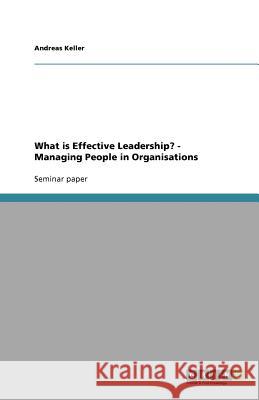What Is Effective Leadership? - Managing People in Organisations » książka
What Is Effective Leadership? - Managing People in Organisations
ISBN-13: 9783656005155 / Angielski / Miękka / 2011 / 40 str.
Seminar paper from the year 2003 in the subject Business economics - Business Management, Corporate Governance, grade: 1.4, University of Strathclyde, language: English, abstract: Leadership as a topic has been extensive studied around the world, yet the terms of reference remain vague. It is easier to define effective, since the dictionary1 definition is clear: producing a strong impression or response. Different authors have offered a whole range of definitions and opinions on what constitutes leadership. Leadership can be defined as the key dynamic force that motivates and co-ordinates the organisation in the accomplishment of its objectives (Dubrin,1997i). It is not so much a science but more an art that influences by example or persuasion to induce action. The executive has to be effective although "to effect" and "to execute" imply something different (Drucker,1993ii). In general, executives are highly intelligent individuals but it seems there is little correlation between a leader's intelligence and his/her effectiveness, as Drucker points out. Generally, overall success can be measured in terms of productivity plus the realization of organizational goals, while the profitability of corporations is typically weighted in money earned. Dedicated, skilled and knowledgeable employees combined with a management team that understands how to inspire competent and motivated performance is geared for success by generating synergy in a continually changing workplace. In addition, a socially responsible management is considered an investment directly impacting the motivation and productivity of the workforce. The leadership quality is responsible for maintaining and creating a supportive workplace environment through fair compensation, proactive management and ethically responsible policies. However, on a lower level, leaders/executives are generally expected to be effective in their execution of their tasks although this should not be taken for granted.











